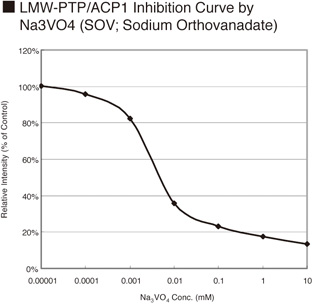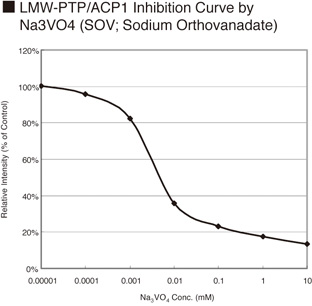CycLex Protein Phosphatase LMW-PTP/ACP1 Fluorometric Assay Kit
| Code | Size | Price |
|---|
| MBL-CY-1358 | 100 Assays | £541.00 |
Quantity:
Prices exclude any Taxes / VAT
Overview
Regulatory Status: RUO
Shipping:
Dry Ice
Storage:
-70°C
Images
Documents
Further Information
Background:
Protein tyrosine phosphorylation plays an essential role in the regulation of many cellular processes, including cellular proliferation, differentiation, migration and tumorigenic transformation. The phosphorylation of proteins on tyrosine is catalyzed by numerous protein tyrosine kinases, and is rapidly and reversibly dephosphorylated by Protein tyrosine phosphatases (PTPases). The low molecular weight protein tyrosine phosphatase (LMW-PTP) is an 18-kDa cytosolic enzyme, also known as acidic protein phosphatase 1 (ACP1). LMW-PTP/ACP1 is specific for phosphotyrosine in peptides and proteins, but the enzyme shares very limited sequence homology with other PTPases. Although LMW-PTP/ACP1 has been showed as negative regulator of insulin- and platelet-derived growth factor (PDGF)-mediated mitotic and metabolic signaling, LMW-PTP/ACP1 is frequently overexpressed in transformed cell. Recent studies suggested that entopic overexpression of LMW-PTP/ACP1 is sufficient to confer transformation in epithelial cells and its oncogenic activities required EphA2. LMW-PTP/ACP1 negatively regulates EphA2 receptor tyrosine kinase. LMW-PTP/ACP1 is a positive regulator of both tumor onset and development through ephrin-EphA2 signaling process, and it is a potential target of anticancer drug development.
Description:
The CycLex® Protein Phosphatase LMW-PTP/ACP1 Fluorometric Assay kit is a fluorometric and
non-radioactive assay designed to measure the activity of LMW-PTP/ACP1 protein phosphatase. This
96-well assay is useful for screening inhibitors and modulators of LMW-PTP/ACP1 activity in HTS.
The kit includes all necessary components, including recombinant, human full length LMW-PTP/ACP1,
for use in preinvestigational drug discovery assays.
Gene IDs:
Human: 52 Mouse: 11431
Kit Components:
10X Assay Buffer, 10X OMFP, Recombinant LMW-PTP/ACP1, 100X Phosphatase Inhibitor, Stop Solution, Instruction Manual
Target:
LMW-PTP/ACP1
References
1). Dissing J, Johnsen AH, Sensabaugh GF. Human red cell acid phosphatase (ACP1). The amino acid
sequence of the two isozymes Bf and Bs encoded by the ACP1*B allele. J Biol Chem. 1991 Nov
5;266(31):20619-25.
2). Wo YY, McCormack AL, Shabanowitz J, Hunt DF, Davis JP, Mitchell GL, Van Etten RL. Sequencing,
cloning, and expression of human red cell-type acid phosphatase, a cytoplasmic phosphotyrosyl protein
phosphatase. J Biol Chem. 1992 May 25;267(15):10856-65.
3). Chiarugi P, Cirri P, Raugei G, Manao G, Taddei L, Ramponi G.
Low M(r) phosphotyrosine protein phosphatase interacts with the PDGF receptor directly via its
catalytic site. Biochem Biophys Res Commun. 1996 Feb 6;219(1):21-5.
4). Chiarugi P, Cirri P, Marra F, Raugei G, Camici G, Manao G, Ramponi G. LMW-PTP is a negative
regulator of insulin-mediated mitotic and metabolic signaling. Biochem Biophys Res Commun. 1997 Sep
18;238(2):676-82.
5). Fiaschi T, Chiarugi P, Buricchi F, Giannoni E, Taddei ML, Talini D, Cozzi G, Zecchi-Orlandini S,
Raugei G, Ramponi G. Low molecular weight protein-tyrosine phosphatase is involved in growth
inhibition during cell differentiation. J Biol Chem. 2001 Dec 28;276(52):49156-63.
6). Kikawa KD, Vidale DR, Van Etten RL, Kinch MS. Regulation of the EphA2 kinase by the low
molecular weight tyrosine phosphatase induces transformation. J Biol Chem. 2002 Oct
18;277(42):39274-9.
7). Chiarugi P, Taddei ML, Schiavone N, Papucci L, Giannoni E, Fiaschi T, Capaccioli S, Raugei G,
Ramponi G. LMW-PTP is a positive regulator of tumor onset and growth. Oncogene. 2004 May
13;23(22):3905-14.
8). Malentacchi F, Marzocchini R, Gelmini S, Orlando C, Serio M, Ramponi G, Raugei G. Up-regulated
expression of low molecular weight protein tyrosine phosphatases in different human cancers.
Biochem Biophys Res Commun. 2005 Sep 2;334(3):875-83.
9). Parri M, Buricchi F, Taddei ML, Giannoni E, Raugei G, Ramponi G, Chiarugi P. EphrinA1 repulsive
response is regulated by an EphA2 tyrosine phosphatase. J Biol Chem. 2005 Oct 7;280(40):34008-18.




